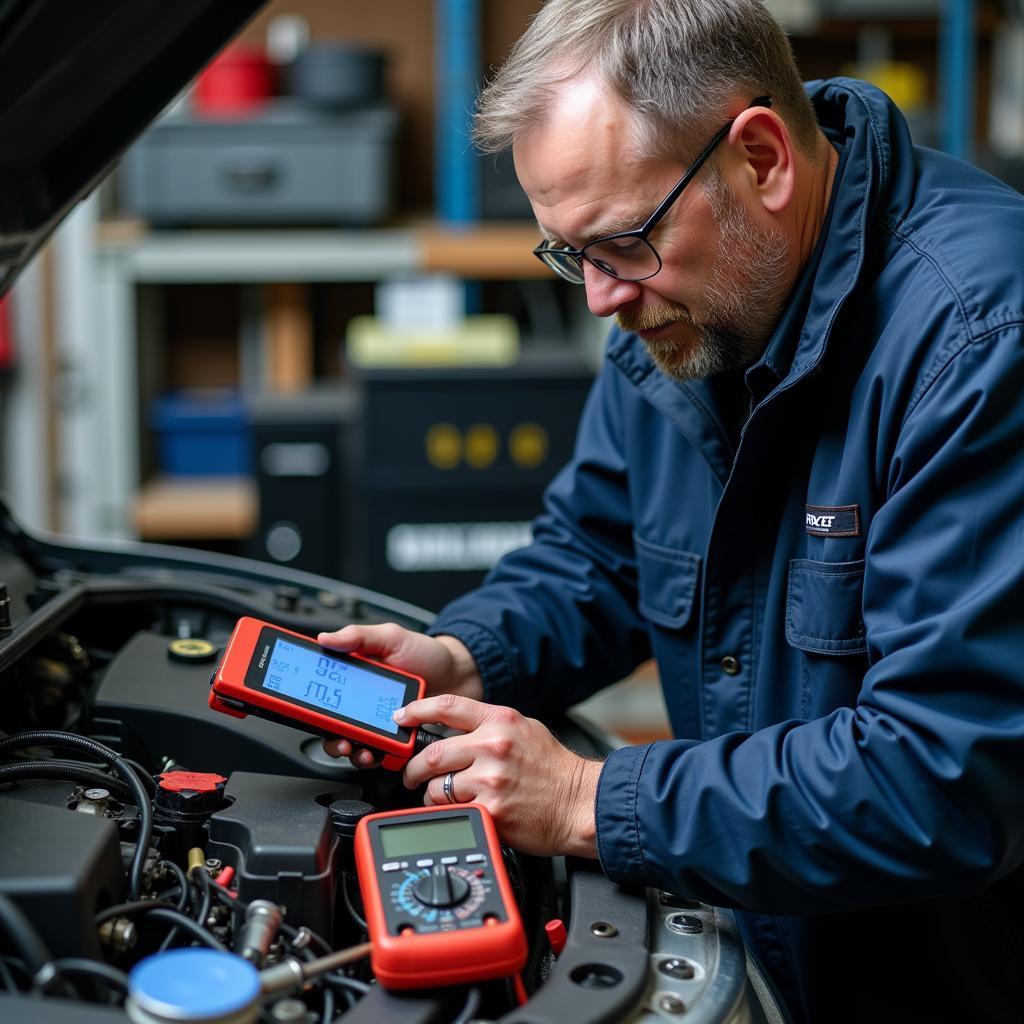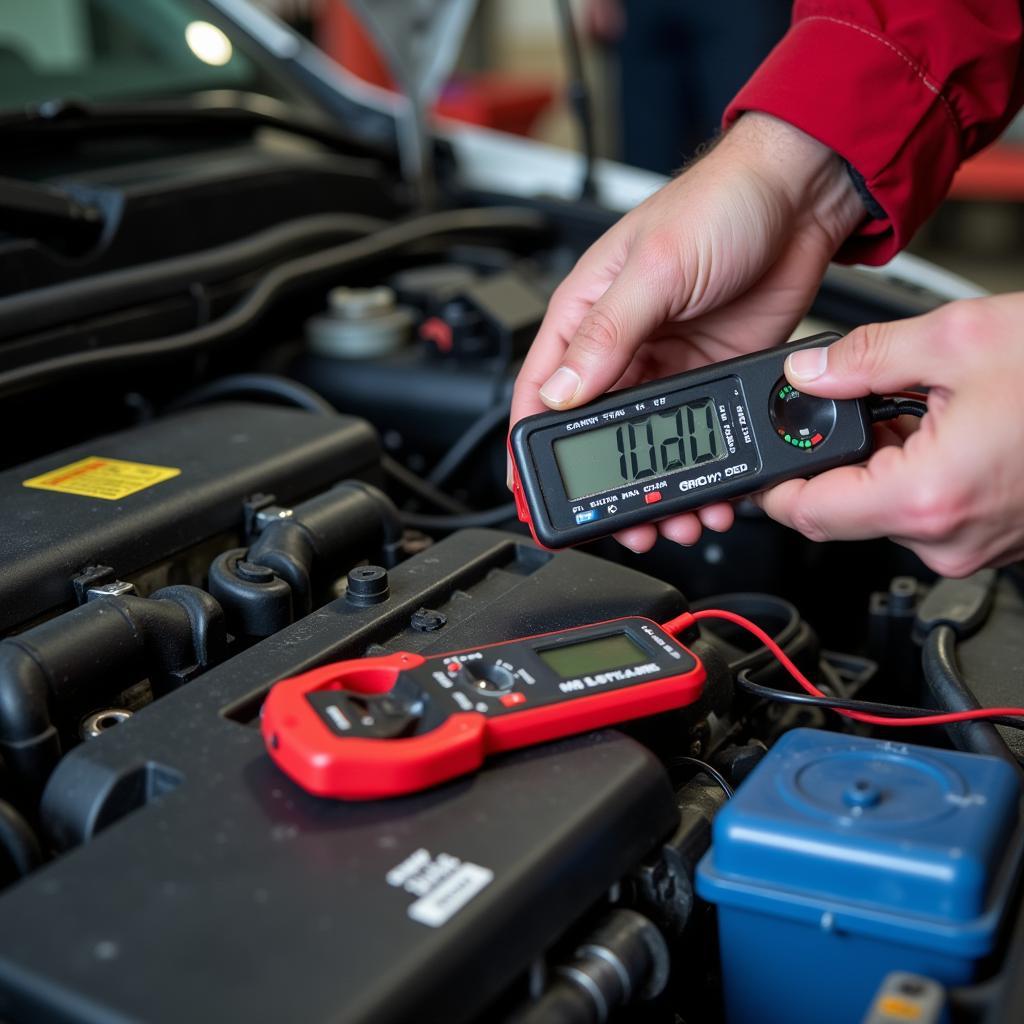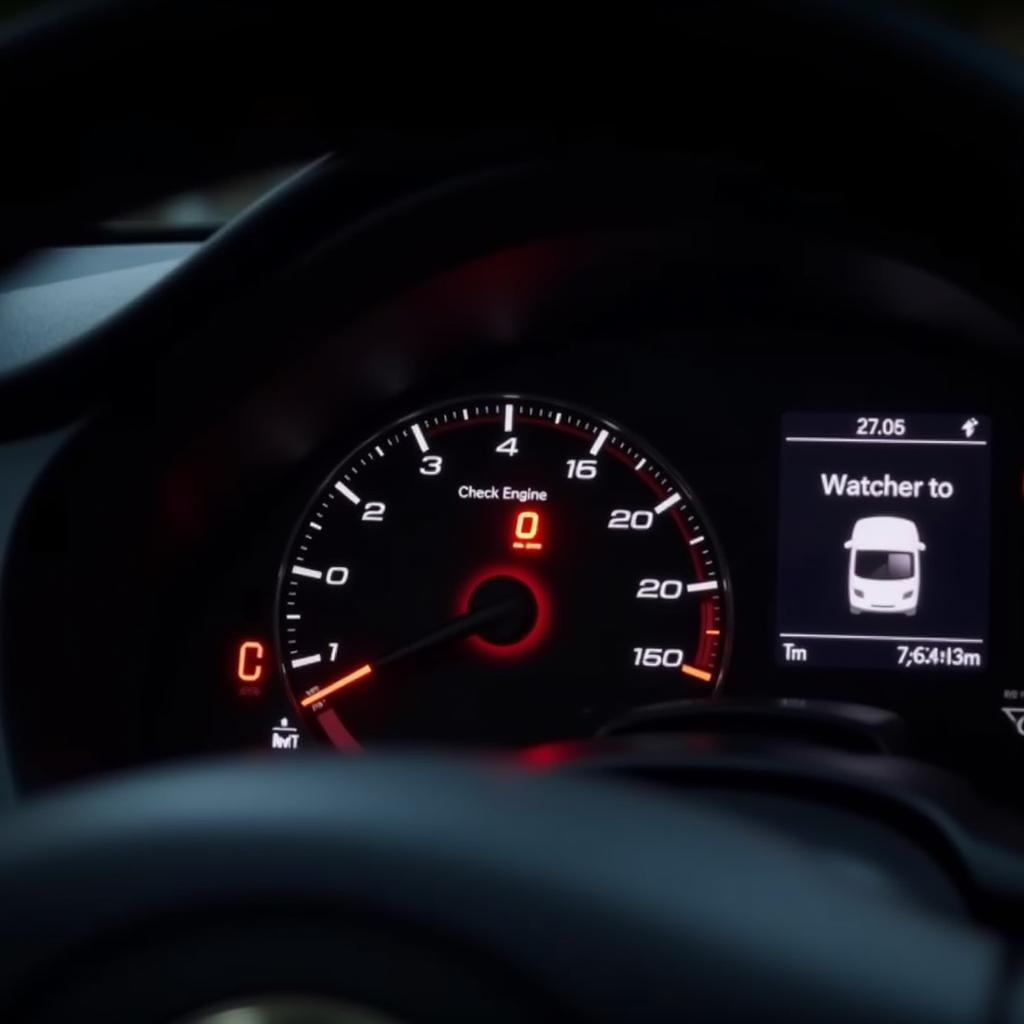Finding the right diagnostic car tools in Glasgow can feel overwhelming with so many options available. Whether you’re a seasoned mechanic or a DIY enthusiast, having the right tools for the job is crucial for accurate diagnosis and efficient repairs. This comprehensive guide will explore everything you need to know about diagnostic car tools in Glasgow, helping you make informed decisions to keep your vehicle running smoothly.
 Mechanic using diagnostic tools in a Glasgow garage
Mechanic using diagnostic tools in a Glasgow garage
Understanding the Importance of Diagnostic Car Tools
Modern vehicles are complex machines controlled by intricate electronic systems. When a fault occurs, pinpointing the root cause often requires advanced diagnostic car tools. These tools provide insights into the inner workings of your vehicle, allowing you to:
- Identify and interpret fault codes: Diagnostic tools can read and translate the error codes stored in your vehicle’s computer, providing valuable clues about the underlying issue.
- Monitor live data streams: Observe real-time data from various sensors and components, such as engine speed, temperature, and fuel pressure, to analyze performance and identify anomalies.
- Perform component activations: Some diagnostic tools allow you to activate specific components, like injectors or solenoids, to test their functionality and isolate faults.
Types of Diagnostic Car Tools Available in Glasgow
Glasgow boasts a wide array of diagnostic car tools catering to different needs and budgets. Here are some common types:
1. OBD-II Scanners
OBD-II scanners are essential tools that connect to your vehicle’s OBD-II port, usually located under the dashboard. They can read and clear fault codes, display live data, and perform basic tests.
- Basic OBD-II Scanners: Affordable and readily available, these scanners offer basic code reading and clearing capabilities, suitable for DIY enthusiasts.
- Advanced OBD-II Scanners: Designed for professional mechanics, these scanners provide more in-depth data analysis, bi-directional control, and special functions tailored for specific vehicle makes and models.
2. Multimeters
Multimeters are versatile tools for measuring electrical properties like voltage, current, and resistance. They are essential for diagnosing electrical faults in various vehicle systems, including:
- Battery and charging system: Check battery voltage, charging current, and alternator performance.
- Sensors and circuits: Measure sensor output signals and test circuit continuity to identify wiring problems.
- Component testing: Test the resistance of components like solenoids, actuators, and relays.
 Using a multimeter to check car battery in Glasgow
Using a multimeter to check car battery in Glasgow
3. Oscilloscopes
Oscilloscopes capture and display voltage signals over time, providing a visual representation of electrical activity. They are particularly useful for diagnosing complex issues related to:
- Sensor waveforms: Analyze the shape and patterns of sensor signals to identify intermittent faults or performance issues.
- Ignition system: Diagnose problems with spark plugs, ignition coils, and distributors by analyzing ignition waveforms.
- Communication networks: Monitor data signals on vehicle communication networks like CAN bus to troubleshoot communication errors.
Choosing the Right Diagnostic Car Tools in Glasgow
With so many options, selecting the right diagnostic car tools depends on your specific needs and expertise. Consider the following factors:
1. Your Skill Level
- DIY Enthusiasts: Start with a basic OBD-II scanner and a multimeter for simple diagnostics and repairs.
- Professional Mechanics: Invest in advanced scanners, oscilloscopes, and specialized tools to handle complex diagnostics and a wider range of vehicle makes and models.
2. Vehicle Make and Model
- Specific Makes and Models: Some tools offer enhanced functionality or specialized software for certain vehicle makes and models. Research compatibility before purchasing.
- General-Purpose Tools: Choose tools that work with a wide range of vehicles for versatility.
3. Budget
- Entry-Level: Basic OBD-II scanners and multimeters offer excellent value for DIY users.
- Professional-Grade: Advanced diagnostic tools represent a significant investment, but their comprehensive capabilities are essential for professional mechanics.
Where to Find Diagnostic Car Tools in Glasgow
Glasgow offers various options to purchase diagnostic car tools:
- Automotive Tool Suppliers: Numerous specialized stores in Glasgow carry a wide selection of diagnostic tools.
- Online Retailers: Explore online retailers for competitive prices and a broader range of products.
- Local Mechanics: Some mechanics may sell used or refurbished tools.
Tips for Using Diagnostic Car Tools Safely
- Consult your vehicle’s service manual: Always refer to your car’s service manual for specific instructions and safety precautions.
- Disconnect the battery: Before working on any electrical components, disconnect the vehicle’s battery to prevent electrical shocks or damage.
- Use appropriate safety gear: Wear safety glasses and gloves when working with electrical components or tools.
- Start with basic checks: Before diving into complex diagnostics, rule out simple issues like loose connections, blown fuses, or low fluid levels.
- Seek professional help when needed: If you’re unsure about a diagnosis or repair, don’t hesitate to seek assistance from a qualified mechanic.
 Car diagnostic light illuminated on a dashboard
Car diagnostic light illuminated on a dashboard
Conclusion
Investing in the right diagnostic car tools in Glasgow is essential for car owners and mechanics alike. By understanding the different types of tools available, considering your specific needs, and using them safely, you can empower yourself to diagnose and address vehicle issues effectively, saving time and money in the long run.
FAQs
Q: What is the most important tool for DIY car diagnostics?
A: A basic OBD-II scanner is a great starting point for DIY car diagnostics, allowing you to read and clear fault codes.
Q: Do I need an oscilloscope for basic car repairs?
A: Oscilloscopes are typically used for more advanced diagnostics and are not necessary for most basic car repairs.
Q: Can I trust the fault codes displayed by an OBD-II scanner?
A: While fault codes provide valuable clues, it’s essential to interpret them in context and consider other symptoms.
Q: Where can I find reliable information about my car’s specific diagnostic codes?
A: Consult your vehicle’s service manual or reputable online resources for detailed information about specific diagnostic codes.
Q: What should I do if I can’t diagnose the problem using my diagnostic tools?
A: If you’re unable to identify the issue, it’s best to seek professional help from a qualified mechanic.

Leave a Reply